Faith A. Colburn's Blog, page 2
March 2, 2018
Big Trees
“The redwoods, once seen, leave a mark . . . that stays with you always.” — John Steinbeck, Travels with Charley,1962
It’s been 56 years since my father took us to the sequoias. We drove through one of the giants and stopped along the road so we could get out of the car and stand in a line before a gigantic trunk. I think my sister has the photo Mom took in the dim forest light. I know the trees drew more reverence from me than any church ever has.
We three—my dad, my sister, and I—stood beneath that tree in an ancient silence too profound to break. I heard no chattering squirrel or screaming jay—not even the little puttering sounds of some tiny rodent or insect. Light came through the fern-like foliage, so far above our heads, in streams. Shafts of light chose small bits of forest floor for celestial illumination.
Statisticians age the trees between twenty-five hundred and three thousand years. Although I know that’s not old enough to have hosted pterodactyls, the flying dinosaurs would have seemed at home among them. As we stood in the forest, I waited to hear a scream.
Steinbeck wrote of a newcomer who bought land near his childhood home near Monterey. The man bought a grove and logged it out. “This was not only murder,” he wrote decades later, “but slaughter.”
I understand his grief. A few years ago i took my son and a niece to share the experience of the grove my father shared. It no longer exists. A few isolated giants remain, but I can’t imagine how they’ll survive.
Where was the respect for an ecosystem that has existed for millennia?
We now know that groves have interconnected root systems that allow individuals to share resources below ground. We know that, when one tree sustains an insect attack, the others prepare their defenses. We know that the trees lean on one another, shelter one another, when high winds toss their crowns.
How could anyone argue that one isolated tree here and another over the hill—maybe a few more of the most spectacular—could be enough? Alone, they’re diminished. It was the grove that drew my respect. The loners are impressive, but they don’t evoke reverent silence. They’re just big trees.
I’ve tried without success to find out what happened to the trees I saw when I was just a kid. Maybe it doesn’t matter. They’re gone and my heart hurts at the loss.
February 23, 2018
Hale Bopp
As I wrote my memoir years ago, there were stories that didn’t make the cut. As I moved my office during the past week, I removed everything from my file cabinet (to make it light enough to lift) and as I replaced my files, I did a major purge. I also found stuff I hadn’t seen in years. Below is one of the orphan stories that didn’t fit the memoir.
 The 4,000-year comet
The 4,000-year cometIn March, 1997, a comet streaked across the silent night sky. My son and I kept tabs on it, night after night, standing in the yard with binoculars. Every night we looked to make sure it hadn’t dropped beyond the horizon as we went about our day.
For 4,000 years that comet had burned its way around the Milky Way Galaxy far out of our sight. As we watched, Ben and I knew that my father had never seen that comet; that my grandfather and my great-grandfather and his grandfather had never seen it.
Long before my European ancestors set foot in America, though, the Olmec in Mexico had seen it as they worked in their corn fields and learned to grow beans, chili peppers, avocado, squash, and cotton. Some of my American ancestors, Iroquois and maybe Shawnee, around the Great Lakes had watched it as they mined copper and hammered it into tools and beads for trading.
Like them, Ben and I watched and wondered where it had come from and where it was going. Would it burn out? Would it continue circling for another 4,000 years? Would some descendant of Ben’s stand watching it 4,000 years in the future? What would she look like? How would she respond to such a once-in-many-lifetimes-event?
Ben and I alone, among all the generations I know of, stood there on that spot and watched it tear silently through the depths of space, appearing to hang immobile to the northwest of our house in Lincoln.
One night, as I stepped through the front door, still staring at the ragged trail of flames, I realized I should be able to see it through the glass of the back door. I walked through the house, threw open the door and there it was, framed in the top left corner of the upper storm door-pane.
My grandmother lived with Ben and me then and when I realized she could see the comet without leaving the house, I was overcome with excitement at the prospect of sharing this celestial event with one of the most important people in my life. Here was something Grandma had never seen in all her 100 years. I could give it to her and maybe rekindle some of her curiosity.
I asked her to come to the back door. She complied—more to please me, I suspect, than to see one more sight in a lifetime of looking. And then, when she reached the door, she didn’t have the gumption to look up. I pointed and described the comet’s position, but she never saw it. Maybe in her heart she was already out there with it, flying with the fire and ice.
February 9, 2018
Jungle Dusk
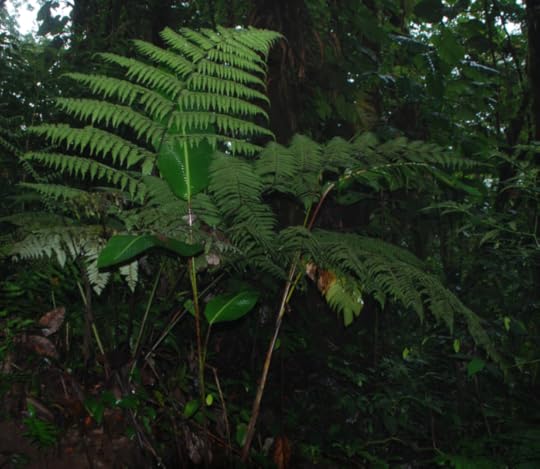 Jungle Dusk
Jungle DuskHe’d lost his way in the rainforest when he ran across a dead enemy with chunks sliced from its body—like roasts. His gorge rose. His mother’s words intruded on his thoughts.
“Try to remember that you’re a human being.”
He’d found that harder the longer he spent fighting.
He penetrated deep into the jungle, listening and sniffing like a wolf. At first the dead man overwhelmed his senses, but he watched the canopy, looking for the sniper who would end him. He almost missed another body lying along the trail.
To make sure the soldier was dead, he kicked it. The eyes opened. Connor kicked again—savage blows to the ribs. The eyes never wavered.
“Remember, the man who’s trying to kill you is a human being too.”
Even when his mom had said it, he’d thought she’d lost her mind.
Starving and sick, the enemy shivered. Connor remembered the Donnor Party site and how lonely it felt. He sat and pulled the ailing enemy’s head into his lap. There in the jungle dusk, he held the soldier—a man as helpless as he against a world gone mad.
He remained until the other stopped breathing.
February 2, 2018
High-Powered Rifle
The following story bit resulted from a prompt, something about wrapping up in a blanket and pretending to be somewhere else if I remember right. Fear seemed to follow and the rifle seemed a solid fear-provoking object.
She wrapped her body in the old crocheted blanket and pretended she was anywhere but here—in the broken-down farmhouse, wondering what she would do next. What would he do? What should she do? Maybe it was time.
She paced around the circle of rooms, kitchen, bath, bedroom, living room, front room, kitchen . . . Her little boy looked up from where he’d been tucked in next to the old chimney, playing.
He frowned. “Where’s Daddy going with the gun, Mommy? Is he going to shoot a deer?”
She stared at him a moment in silence, then scooped him up and stalked into the living room, flopping on the couch and setting him on her lap, along with the little truck he’d had in his hands. They sat that way in silence for a few moments, the little boy looking into her eyes.
“No.”
“He looked pretty mad.”
She considered that, running a gentle hand up and down her son’s back.
“He’s been mad before.”
Of course, he’s never taken the rifle before, either. she thought.
“Will he come back for supper?
“Oh!”
She jumped up, letting the blanket slip off her shoulders onto the couch, switched her son to her hip, and hurried into the kitchen to stir the pot of stew she had on the stove.
“Smells good, Mom.”
“You hungry?”
“A little.”
She set him down in his high chair and served up a bowl of soup. She poured him a glass of milk and opened a new box of crackers. She sat at the table and watched him eat, occasionally wiping up a spill.
“Aren’t you going to eat, Mom?”
“I’m not hungry, Sweetie.”
“Better eat up. You never know when you’ll get to eat again.”
She smiled at him. “That’s right,” she said, wondering when any of them would have a chance to eat; wondering where her husband had gone; wondering if he was drunk or just mad.
While her little boy scooped up his stew and got most of it in his mouth, she thought about her husband’s arrival a few minutes earlier. When she’d heard him pull into the yard, she’d glanced out the window. She could see his rage in his posture and the rigid way he’d stomped into the house. She’d wondered what set him off this time.
He’d stormed into the bedroom where he had a high-powered rifle racked in a little alcove and came stomping out mumbling something she couldn’t quite understand. She thought she caught a neighbor’s name somewhere in the diatribe. She remembered telling the women at the center that she believed she could whip him if it came to a fight—and it looked like it was going that way. But with a gun?
She remembered the escalating pattern of threats that had sent her into town to check her options. She had a number to call to get to a shelter. She wondered what it would be like. It’s time, she decided.
“You all done?” she asked.
“Yup. “Mm-mm good.” He grinned at her.
“Okay Buddy, we’re gonna take a little trip.”
“We gonna see Grandma?”
“Nah. We’re going someplace you’ve never been.”
He frowned.
“Let’s get you some extra clothes . . .”
She stormed through the house, grabbing necessities, slung her purse over her shoulder, set her son on her hip, and grabbed the bag of belongings. She closed the door behind her and tucked her son into his car seat, glancing over her shoulder as she pulled out of the yard. At a friend’s house on the way to town, she stopped and called the county sheriff.
“I’m leaving home right now,” she said, “but my husband just took off with the high-powered rifle, looking for the neighbor.”
She gave names and addresses and then she called the shelter number and drove on to the rendezvous point. She had no money, no job, and no credit.
January 26, 2018
The Spark: Genius and Autism
As a writer of memoirs and historical fiction, I’m passionate about people’s stories. Although I don’t care that much about rich and powerful people, I care a great deal about the so-called “little people.” I could go on about that patronizing term for the folks who allow our leaders to succeed through their labor and cooperation, but I’ll save it for another time.
When I ran across Kristine Barnett‘s book entitled The Spark: A Mother’s Story of Nurturing Genius and Autism, I thought this might be my kind of book.
Kristine’s story begins with a teacher who tells her that her three-year-old son will never read—”a devastating moment,” she writes. She’s already spent a year watching her baby’s abilities disappear, but she couldn’t prepare herself for such a diagnosis. Then she writes, “For a parent, it’s terrifying to fly against the advice of the professionals.”
How well I know that feeling. I have two sons with learning disabilities that I understood long before I could get anyone to listen to me. The trouble was, I didn’t know what to do about it. Kristine did.
This book resonated from start to finish. How I wish she’d published it back in the 1970s when the first of my very bright sons entered kindergarten. I was taken by Kristine’s flashbacks to moments leading up to Jake’s birth and diagnosis, but for me the meat came when she decided to go against the professionals and follow her own instincts—allow her son his passions. After watching excruciating hours of forcing her son to do therapeutic activities, she decided to forego reinforcing those therapies at home like the pros advised and let him do the things he was passionate about.
One of those things, a hallmark of autism, is spinning. He would spin objects, other kids if they would cooperate, even himself. The experts call it self-stimulation (maybe like a bored horse cribbing), but it turned out that Jake was modeling the solar system. I use that story only as an example of things non-verbal people do that the rest of us “normal” people don’t understand. Kristine didn’t understand at the time, either, but she gave her son time to do what he wanted to do.
I can’t share here all the wisdom Kristine has to impart—not only about kids whose brains work a little differently than the average, but about all the rest of them too. I was out of my depth with my kids and they suffered for it. Ms. Barnett was not. You can follow her on Facebook, and I recommend The Spark: A Mother’s Story of Nurturing Genius and Autism to anyone who has children in their lives. If your local bookstore doesn’t have it, ask them to order it. You will want to keep a hard copy for reference.
January 19, 2018
One Page at a Time
M.K. Tod interviewed Tony Riches on her blog, A Writer of History,that posted yesterday. It was part of her Second Career Writers series and I read through casually—until I got to the very last question. “What advice would you offer other second career writers?” Not a blockbuster question, but I’m glad she asked.
The answer: “Read as much as you can – and remember if you only manage to write one page a day, that’s a book a year!”
Now that answer is logical, not a blockbuster, either. And yet, I couldn’t get past it. Why didn’t I think of that? It’s not brain surgery, but I’ve struggled to finish writing the scenes during which my protagonist’s entire squad gets killed. I’ve done the research.
Read World War II Jungle Warfare by Stephen Bull, and
The actual military archival accounts of the battle I’m fictionalizing, and
World War II Infantry Field Manual, and
Bushmasters by Anthony Arthur (about the regiment), and
Braun’s Battlin’ Bastards by Harold Braun (a memoir about another company in the regiment), and
James Jones’s Thin Red Line, and Norman Mailer’s The Naked and the Dead for a sense of how others depict men at war in the Pacific.
I’ve watched the mini-series The Pacific so I can visualize what those jungle battles were like.
But after all that reading and watching, instead of feeling well informed and ready to charge ahead, I felt overwhelmed. Here’s where Tony’s advice got me writing again. No matter how stuck I am—and I’ve been stuck for a month or so—I’ve talked myself into believing I can write one thoughtful page a day by referring only to the relevant materials rather than everything I’ve seen and read. I tried it yesterday on a landing G Company of the 158th Infantry regiment made on the Arawe Peninsula, New Britain. It’s one page and only a bit of that landing. First draft, but I got words on paper.
Well sure, it’s far from perfect and maybe I’ll have to commit to writing a page a day AND editing a page a day, but at least it’s a goal I can shoot for with some hope of hitting the target.
Connor and his squad along with other members of G Company platoon squatted in the bottom of a landing craft, full packs on their backs, rifles gripped butt down on the deck in white-knuckled hands, and helmets buckled down on their heads. Although he noticed Mendez clenching and unclenching his jaw, mostly the faces stayed as impassive as the men could make them. He twitched to ease the straps over his shoulders and across his chest. Several others twisted or squeezed fingers under the straps to ease pressure and allow blood to flow down their arms.
Water sprayed in a cascade over the front of the boat as it accelerated and plowed toward the shore like a truck loaded with livestock. So far, they’d been lucky. No enemy aircraft had greeted their landing. Connor felt a thud when the boat hit the beach.
“Head for the trees,” he yelled as men began bailing over the dropped deck like giant sea turtles, packs bulging with field equipment.
Connor hit the water running, knee-deep in the ocean, rifle gripped across his chest. He spotted Green, machine gun balanced across his shoulders, and Tats Wilson right beside him, bandoleers of ammo strapped across his broad chest. He glanced up at the beach.
“Welcome to Arawe,” yelled one of the 112th Cavalrymen lounging in the trees about ten yards in.
“It’s about time you got here,” yelled another. “We already cleaned out all the Japs.”
Connor grinned. “That so?”
He thought it was a gorgeous day for a landing. He dropped his pack inside the tree line and started to flop on the sand—maybe get the skinny from the men who had been there a while. Besides sun on water, he could see broken trees and burned out craters and he knew his company had been brought up to reinforce troops who needed help.
“All right,” yelled Captain Cumming, “Off your asses and onto your feet. Get out there and help unload those barges.”
é
It had taken the 158th almost a year to get from Panama to its first battle and they hadn’t seen any action yet. Nobody complained, although Connor heard lots of groans about unloading yet another boat.
Connor’s squad, assigned to establish a human chain to move supplies off the beach as quickly as possible, joined troops already working. One by one, they handed off crates of food and materiél. They’d been ashore only a few minutes when word came down the line. Enemy aircraft were on the way.
Work continued.
The ships standing off shore held their food, ammunition, and most importantly, water. If they couldn’t get it ashore and protected, they’d be crippled before they started. Men of the 158th mixed with the half-dressed (and some completely undressed) cavalrymen already engaged. Connor wished he had time to remove his shirt—even his pants. Hell, he didn’t see any women on the beach. Instead, he grabbed crates and handed them off to the next guy.
As he worked, he glanced around. The beachhead was alive with activity—men unloading landing craft even as the boats backed out to be replaced by others. They looked like water spiders skimming from ship to shore. Farther down the line, tanks clanked off metal ramps along with other heavy ordnance that moved up to the tree line in ponderous chaos.
He remembered an image brought to mind years before by a trapper friend of his father’s—Old Bud Winslow.
“You know,” the old man had said, “goin’ by the number of animals I trap every night and the ones I see in my headlights when I go check my traps, the earth’s crust must crawl with living things in the dark.”
That’s what the landing beach looked like at the moment when someone spotted the first speck in the sky and shouted out, “Here they come!”
Men glanced over their shoulders and kept moving—maybe just a little faster, like frenetic puppets working without will or thought.
So here I go to write day two; page two. Wish me luck.
January 12, 2018
Who Would Have Guessed? Brewmaking?
 Audiobook jewel case
Audiobook jewel caseDuring my recent long drive to visit one of my sons for the holidays, I listened to an audio book gifted by another son and daughter-in-law. I have to begin by saying I loved this book The Brewer’s Tale, by Karen Brooks, and its narrator, Hannah Norris. Since I’ve considered recording audiobooks to extend the reach of my books, I found such a prize of particular interest.
First, the author deserves congratulations on her detailed and broad research.
Her description of ale- and beer-making in the 15th Century is impressive. As a reader, I could see the brewhouse, smell the ale, visualize the process—start to finish.
The roles and restraints of women become painfully clear as Anneke Sheldrake, after her father is lost at sea, seeks a way to support her family.
As the book progresses, we see the power and corruption of the Church playing out in the tragedies Anneke and her family suffer.
We learn much about the politics and commerce of western Europe and the British Isles.
But research is not Ms. Brooks only forte. I found her plot riveting. When I stopped for the night, I would sit in the car and listen until the end of a chapter, and sometimes the next. NPR calls them “driveway moments.” I had them when I stopped for gas or a meal, as well as sleep.
Brooks’ characters are well drawn, sympathetic people who seize your attention and refuse to let go. Brooks has a large cast of characters and she manages every one with skill. Amazing from this distance in time is Brooks’ ability to distinguish her rural characters from the urban people of London.
Thoughts of character brings me to the narrator, Hannah Norris. What a performance! Did I mention the large cast of characters? Yet Ms. Norris depicts them all with spirit. I was sometimes taken back by her ability to speak in the voice of a young, hesitant woman in one moment and switch to the voice of a corrupt, threatening priest in the very next. Kudos to the actor.
Overall, I highly recommend The Brewer’s Tale by Karen Brooks. If you can work listening time into your busy schedule, you won’t be sorry if you hear it , narrated by Hannah Norris, rather than read it.
December 15, 2017
Grandpa Was a Hillbilly
 This is where Grandpa George grew up. Eva Colburn on left, Edna and little Edna, Grandma Frank on right.
This is where Grandpa George grew up. Eva Colburn on left, Edna and little Edna, Grandma Frank on right.My grandpa was a hillbilly so Hillbilly Elegy: a Memoir of a Family and Culture in Crisis by J.D. Vance seemed like an opportunity to learn something about a man I barely knew. Grandpa died shortly after my ninth birthday and all I know about him came from Grandma. She said he came from Daleyville in southern Ohio—south of Chillicothe and not far from Kentucky. He grew up in Appalachia, the country Vance calls home, even though he grew up in Middletown, Ohio.
Three generations of my family imported spouses from Ohio. My great-grandfather came from the same neighborhood as Grandpa and my mother came from the northeastern cities. The two men came early—Great-grandpa in the 1890s and Grandpa in 1912.
I found myself comparing my family to Vance’s from the get-go.
I know very little about my Grandpa’s life in Ohio. I know his family barely survived with a little subsistence farming and hunting. Grandma said my grandfather and his brothers dug and sold ginseng and sassafras root and that they cut ties for the railroad that still pushed tentacles all over the country. As extractive industries moved into the hills, they squeezed people off land they’d always considered public resources. My grandfather had hunted all winter with his friend, Johnny Bivens. Then the two men came to Nebraska in a blizzard to visit Johnny’s sister. When my Great-grandfather offered Grandpa George a job, George grabbed it.
Vance writes a great deal about the poverty in his favorite corner of Appalachia near Jackson, Kentucky. He notes that about 1/3 of the townspeople live in poverty; people are “physically uhealthy.” He says they’re “mean about it.” They won’t reveal their needs because they don’t want to be judged. He writes that his grandparents moved to Middletown to find a better life.
The remark about health reminds me of what Grandma said. My grandfather—a man in his early twenties—had lost many of his teeth by the time they met in 1912. She thought their diet back in the hills was terrible. Vance doesn’t think it’s much better now.
Early in his narrative, Vance mentions a cousin, Mike, who decided to sell his mother’s house soon after her death. Vance quotes Mike: “I can’t live here, and I can’t leave it untended. The drug addicts will ransack it.”
Although I didn’t worry too much at first about drug addicts, the raccoons started to ransack Grandpa’s and Grandma’s house, and once when I went to check on it, I found a wren who had squeezed onto the front porch where she built a nest. It broke my heart last fall to sell all 240 acres of it. Grandpa died in 1955, but you can still see the pattern of his mind on that land 60 years later—although time has ravaged much of what he built and I couldn’t maintain it.
Vance mentioned at least one very early marriage and teen pregnancy. My grandmothers had been midwives for generations, though, and had seen what happens to girls whose bodies haven’t fully developed when they try to have a baby. When Grandpa proposed on Grandma’s 16th birthday, my great-grandparents happily consented to the marriage—but not until their daughter reached the age of 18. It was a good thing, too. Grandma’s first-born, my dad, weighed 12 pounds.
Vance writes about fierce Scots-Irish family loyalty and I certainly recognize that in my grandparents’ family on both sides. My favorite example involves my grandmother’s nervous breakdown and the two families’ attempts to heal her. Grandpa thought maybe a long vacation would help, so he gathered her brothers and sisters for a long haul to California in 1928. He and Grandma had a farm, though, so somebody needed to take care of it. That’s where Grandpa’s brothers and sisters came in, keeping things up while Grandma and Grandpa were gone. It was, indeed, curative.
Lest I give away too much, I will stop here with a recommendation–be sure to read Hillbilly Elegy: A Memoir of a Family and Culture in Crisis by J.D. Vance. This family memoir provides a glimpse into a part of the country most outsiders don’t see, warts and all. The pressures on the proud people in this part of America are immense and it’s good to know a little more about them.
December 8, 2017
Photography as Meditation
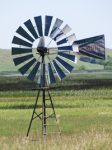 short windmill
short windmillI received my copy of UU World (The Magazine of the Unitarian Universalist Association) a couple of days ago and finally had time to start reading this morning. I haven’t read it all, but an article entitled “Deeper Attention” by Anitra Lavanhar immediately caught my attention.
Lavanhar referred to the deeper attention she paid to her surroundings when she carried a camera. That thought really resonated and as I read her article over breakfast, I thought of my own blissful hours carrying a camera.
Those hours began when I worked for the Nebraska Game and Parks Commission as a public information officer. The agency proved a training ground for me when the powers that be decided they needed people who could both write the articles and take the pictures. At that point I had two small children, no camera, and no money to buy one, so the company camera became my life line.
Thinking about photography, I remembered a spring trip, just a couple of years ago and long after I left the G&PC. By now, I have my own camera, a Nikon D80 and a few accessories. Driving through Nebraska’s Sandhills, I couldn’t help stopping every few miles. I became completely focused on the camera and what I found in front of the lens.
All my other identities slipped away and I became what master G&PC photographer, Lou Ell, used to call a photo-snappy-shooter. I took pictures of the Sandhills’ ridiculously short windmills, with black Angus cattle strung out to the left—with a bald blue sky and spring-green hills in the background.
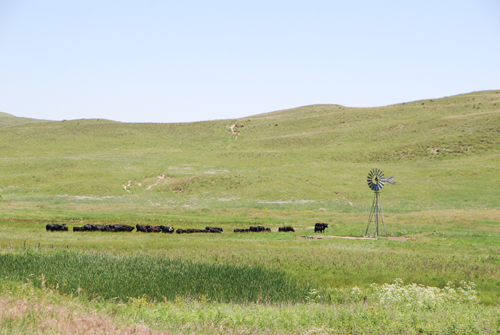 Cattle at the windmill.
Cattle at the windmill.I would walk a few steps and see a flower I wanted to photograph.
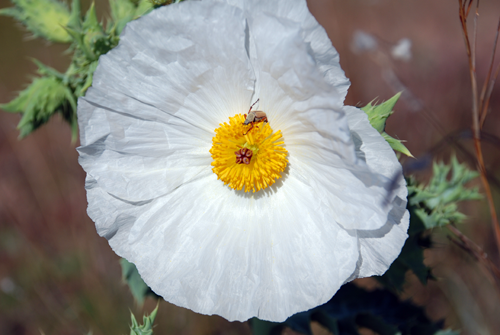 Prickly Poppy
Prickly PoppyI found pelicans and ducks and I tuned out everything but the critter and the angle and trying to get close enough to make the shot count. As I think about it now, I realize that, in those hours I had nothing in my life but the warm sun on my back, a little breeze in my face, the musty smell of sub-irrigated meadows in my nose, and my attempts to bring it to life in images I would store on a memory card.
 Blue-Winged Teal
Blue-Winged Teal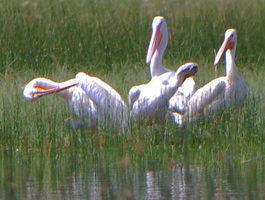 Grooming Pelicans
Grooming Pelicans Canada Geese
Canada Geese
December 1, 2017
Circles Within Circles
There’s a tightrope walker on a cable between the still-standing World Trade Center towers. He ties the many threads of Colum McCann‘s novel Let the Great World Spin because, at some point in the novel, everyone sees the walker—including:
Two little boys playing in Ireland. One grows up to be a monk in New York City. His brother follows him to the city, helping him out from time to time.
A group of gold-star mothers who’ve lost their sons in Vietnam. These women, from very diverse backgrounds, can tell their sons’ stories to an understanding audience. Interestingly class difference seems to provide more of a barrier than race, religion, or ethnicity.
A group of hookers that includes a mother and daughter. The monk leaves his apartment unlocked so the prostitutes can use the bathroom.
An artist and his wife who connect with the monk and one of the prostitutes. To say how would be a spoiler.
And a judge, a gold-star father who sees the prostitute mother and the tight rope walker in his court.
This book starts out looking like a short story collection. In fact, I had to close the book a couple of time to read the cover. Yes, it is a novel. As the various stories develop, the connections become clearer until McCann reminds us in the end that “Literature can remind us that not all life is already written down; there are still so many stories to be told.”
I highly recommend this intricate novel, Let the Great World Spin by Colum McCann.



